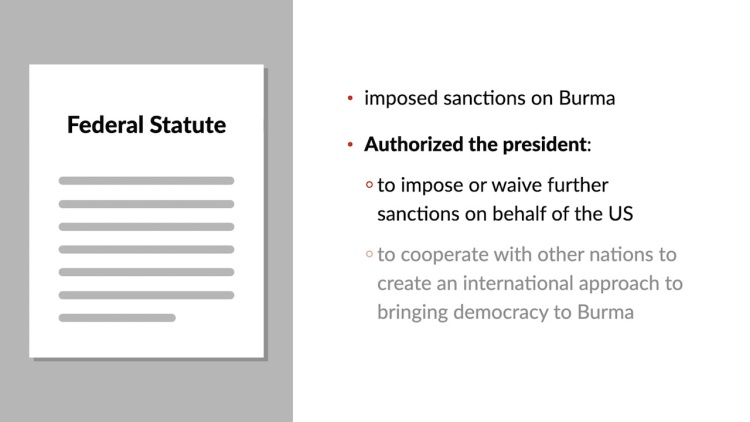Crosby v. National Foreign Trade Council
United States Supreme Court
530 U.S. 363 (2000)
- Written by Samantha Arena, JD
Facts
For decades, Myanmar, an Asian nation also known as Burma, was guilty of widespread human-rights violations. The United Nations and many countries often denounced Myanmar for the abuses. In 1996, the State of Massachusetts (defendant) enacted a law entitled “An Act Regulating Contracts with Companies Doing Business with or in Burma (Myanmar)” (the act). The law prohibited the state from buying products or services from any person or company doing business with Burma. Massachusetts compiled a list of companies that the state refused to do business with as a result of the regulation. Similarly, the United States Department of State and Congress established federal policies and regulations condemning Burma and limiting business with Burma. Specifically, the Foreign Operations, Export Financing, and Related Programs Appropriations Act authorized the US president to impose economic sanctions against Burma and to lift those sanctions if the president determined that the sanctions would be against the United States’ national-security interests. In 1998, the National Foreign Trade Council (plaintiff), a group that included companies on Massachusetts’ restricted-business list, sued Massachusetts in federal district court, contending that the state statute unconstitutionally interfered with the federal government’s foreign-affairs power. The district court ruled in favor of the National Foreign Trade Council, and the United States Court of Appeals for the First Circuit affirmed. Massachusetts appealed to the United States Supreme Court.
Rule of Law
Issue
Holding and Reasoning (Souter, J.)
Concurrence (Scalia, J.)
What to do next…
Here's why 907,000 law students have relied on our case briefs:
- Written by law professors and practitioners, not other law students. 47,100 briefs, keyed to 996 casebooks. Top-notch customer support.
- The right amount of information, includes the facts, issues, rule of law, holding and reasoning, and any concurrences and dissents.
- Access in your classes, works on your mobile and tablet. Massive library of related video lessons and high quality multiple-choice questions.
- Easy to use, uniform format for every case brief. Written in plain English, not in legalese. Our briefs summarize and simplify; they don’t just repeat the court’s language.





